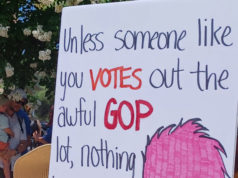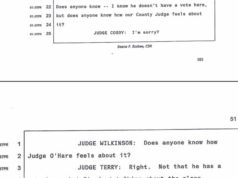So the U.S. Supreme Court ruled Monday on a tiny Texas case that could have huge implications across the country. A little municipal utility district wanted to be able to “opt out” of part of the Voting Rights Act that requires governmental bodies to get prior clearance from the U.S. Department of Justice before making changes that could affect how elections are run. Kinda like asking to opt out of that pesky requirement to be sworn in prior to giving testimony.
In its 40-plus-year history the Voting Rights Act has changed the course of American history, giving racial minorities and other groups in 16 states (that had a past history of racial discrimination) a fair shake at being allowed to vote, having their votes counted, and having the chance to elect people who fairly represent the population.
The Austin district just wanted to move its voting site from a garage to a school – for Pete’s sake, why should that be a federal case? Well, because helping the district with its legal fight was a powerful conservative group whose intent was to get the high court to declare the law unconstitutional.
The court’s ruling was very narrow: It held that the little utility district could opt out but upheld the most important parts of the act. There was something in the ruling for just about every side in the controversy. Civil rights leaders liked the fact that the law survived; conservatives figured the ruling means it’s open season on the Voting Rights Act and that lots of other government entities will challenge it or ask to be excused from its admittedly onerous provisions. The justices indicated that they believe that the problems of voter intimidation and other very real harms at which the act was directed are, for the most part, history. Wow, those judges must have never been to East Texas, or parts of Alabama, or any number of places where people of color are still treated like second-class citizens.
The Texas State Conference of the NAACP “has a different experience,” and NAACP branches throughout the state are putting out a call for information on voting irregularities. (Call ’em at 512-322-9547 if you think you’ve got something.) The organization intends to conduct hearings across Texas in the next six months.
So, from little Texas seeds, a campaign may grow. As various news organizations have reported, the ruling could have implications for Texas’ voter ID legislation and for future redistricting efforts in the state.
And you thought the political pot-stirring was over for a while when the legislature left Austin.











